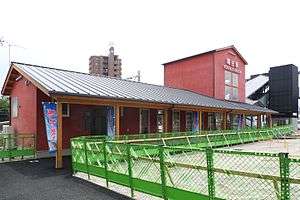Yōkoku Station
Yōkoku Station (暘谷駅, Yōkoku-eki) is a railway station on the Nippō Main Line operated by JR Kyushu in Hiji, Ōita, Japan.[1][2]
Yōkoku Station 杵築駅 | |
|---|---|
 Yōkoku Station in June 2016 | |
| Location | Hiji, Ōita Japan |
| Coordinates | 33°22′12″N 131°31′48″E |
| Operated by | |
| Line(s) | ■ Nippō Main Line |
| Distance | 108.4 km from Kokura |
| Platforms | 2 side platforms |
| Tracks | 2 |
| Construction | |
| Structure type | At grade |
| Disabled access | Yes - footbridge to platform served by elevators |
| Other information | |
| Status | Staffed ticket window (outsourced) |
| Website | Official website |
| History | |
| Opened | 9 March 1987 |
| Traffic | |
| Passengers (FY2016) | 810 daily |
| Rank | 189th (among JR Kyushu stations) |
| Location | |
 Yōkoku Station Location within Japan | |
Lines
The station is served by the Nippō Main Line and is located 108.4 km from the starting point of the line at Kokura.[3]
Layout
The station consists of two side platforms serving two tracks at grade. The station building is a modern concrete structure, built in 2016, which houses a staffed ticket window, a waiting area and various community facilities. There is also a footbridge, served by elevators, which provides access to the opposite platform as well as 24-hour free passage to the street on the other side of the station.[2][3][4][5]
Management of the station has been outsourced to the JR Kyushu Tetsudou Eigyou Co., a wholly owned subsidiary of JR Kyushu specialising in station services. It staffs the ticket booth which is equipped with a POS machine but does not have a Midori no Madoguchi facility.[6][7]
History
Japanese National Railways (JNR) opened the station on 9 March 1987 as an additional station on the existing track of the Nippō Main Line. With the privatization of JNR on 1 April 1987, the station came under the control of JR Kyushu.[8]
In 2016, the town of Hiji completed a major urban redevelopment project involving the station. The station was moved 100 metres to the east and a new station building was constructed, incorporated a waiting room, a community interaction area nad gallery as well as a footbridge which is available as a free passage to the street on the other side of the tracks.[4][5]
Passenger statistics
In fiscal 2016, the station was used by an average of 810 passengers daily (boarding passengers only), and it ranked 189th among the busiest stations of JR Kyushu.[9]
See also
References
- "JR Kyushu Route Map" (PDF). JR Kyushu. Retrieved 23 February 2018.
- "暘谷" [Yōkoku]. hacchi-no-he.net. Retrieved 29 April 2018.
- Kawashima, Ryōzō (2013). 図説: 日本の鉄道 四国・九州ライン 全線・全駅・全配線・第4巻 福岡エリア [Japan Railways Illustrated. Shikoku and Kyushu. All lines, all stations, all track layouts. Volume 4 Fukuoka Area] (in Japanese). Kodansha. pp. 45, 80. ISBN 9784062951630.
- "暘谷駅が移転 新駅舎完成" [Yōkoku Station moved. New station building completed.]. Yomiuri Online. 18 May 2016. Archived from the original on 29 April 2018. Retrieved 29 April 2018.
- "踏切通らず移動 暘谷駅の自由通路と駅舎完成" [Doing without a railway crossing. Yōkoku Station free passage and station building completed]. Oita Godo Shimbun. Archived from the original on 22 April 2016. Retrieved 29 April 2018.
- "大分支店内各駅" [Stations within the Ōita Branch]. JRTE website. Retrieved 9 April 2018.
- "暘谷" [Yōkoku Station]. jr-mars.dyndns.org. Retrieved 29 April 2018. See images of tickets sold.
- Ishino, Tetsu; et al., eds. (1998). 停車場変遷大事典 国鉄・JR編 [Station Transition Directory - JNR/JR] (in Japanese). II. Tokyo: JTB Corporation. p. 752. ISBN 4533029809.
- "駅別乗車人員上位300駅(平成28年度)" [Passengers embarking by station - Top 300 stations (Fiscal 2016)] (PDF). JR Kyushu. 31 July 2017. Archived from the original (PDF) on 1 August 2017. Retrieved 3 March 2018.
External links
| Wikimedia Commons has media related to Yōkoku Station. |
- Official website (in Japanese)